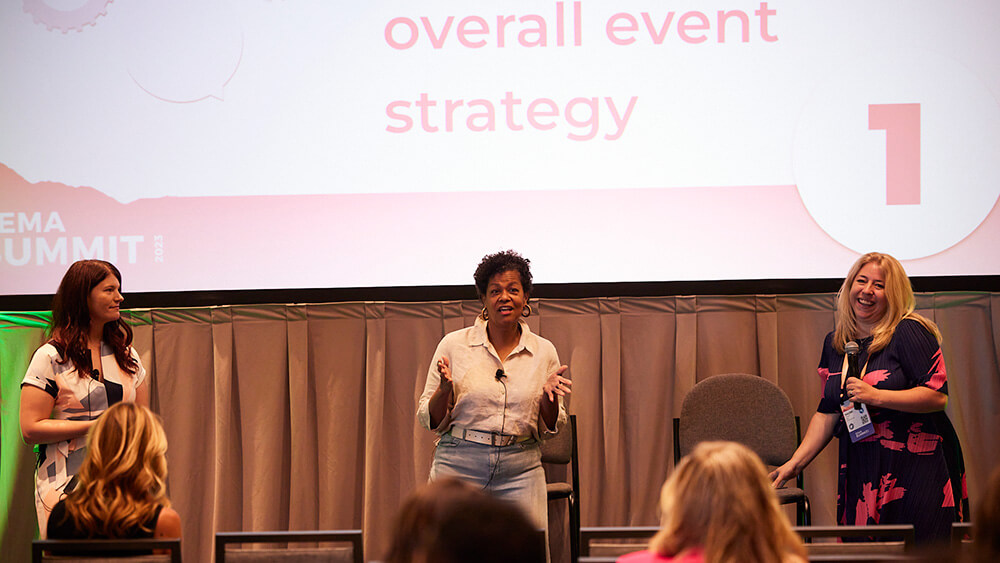
Rachel Heller (from left), Allison Crooker. and Naomi Clare Crellin discuss the how-to’s of building an event strategy at CEMA Summit. (Two Dudes Photo)
More than 500 corporate event marketers and their industry partners came together for CEMA Summit 2023, powered by PCMA, Aug. 6-8 in Salt Lake City, Utah, for a program designed to help them sharpen their strategy, analytics, and soft skills.
For the upcoming September/October issue, Convene editors summarized main takeaways from a handful of sessions to give you a sample of the knowledge exchanged during those three days. We continue the series online with ideas to help organizers think like content strategists.
CEMA Summit Session: ‘How to Think Like an Event Content Strategist’
Two event content experts — Allison Crooker, director of event content VMware and founder of the Event Content Council, and Rachel Heller, event content lead at GitHub and a contributing member of the Event Content Council — mapped out the most important goalposts on the event content journey, and what that means for event organizers. Here are a few of the insights they shared:
Develop an event content strategy that supports the overall event strategy. “When I speak about… event content strategy, I am talking about the experiential part of the training, the learning, the education,” Crooker said, but event content also includes everything from digital signage to important messaging during keynotes, she said. “It can be a very pervasive, all-encompassing thing to tackle,” she said, advising that the first thing event content strategists need to do is define their scope, and as they determine that, think about the high-level strategy to support the event’s goals.
“Content is the leader in making sure that the event meets its strategy, its KPIs. So without a content strategy, you drop too fast into content development and execution. Without a strategy, you’re kind of lost and you don’t have a benchmark you can go back to people with,” Crooker said. With a strategy in place, Crooker said event organizers have measurable content goals to return to and say, “Does this fit [the strategy]? Does this not? Why doesn’t it?”
Ensure that event content is being marketed effectively. “All of the good nuggets of wisdom that are coming out of your catalog, you should share with your marketing team,” Heller said, “and not only share it with them, but make them part of the development process.” She recommended involving the marketing team in the content strategy from the very beginning of the cycle, so that they understand the goals and are collecting information that will help personalize content and marketing throughout the cycle.
Leverage the event speakers’ platforms. “They have a microphone onsite, and then they have a megaphone before and after,” Heller said. “Enabling your speakers to promote your event is really important, whether that’s using tools to help with that, whether that’s creating a speaker promo kit, creating social copy for them to use, creating imagery for them to share, helping them think about making videos [or] writing blog posts. Enabling them to promote their thought leadership at your event also promotes your event.”
Focus on accessibility. “You need to make sure that it’s really easy for them to navigate your catalog,” Heller said, “whether that’s using filtering [or] whether that’s creating specific journeys for them.”
Casey Gale is managing editor of Convene.
More From CEMA Summit
